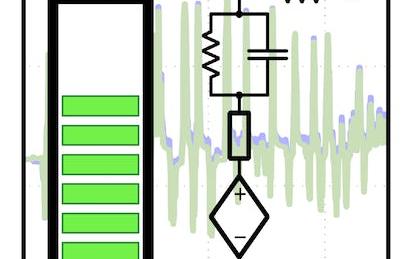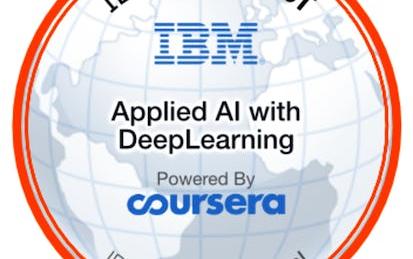

Our Courses
Model Thinking
We live in a complex world with diverse people, firms, and governments whose behaviors aggregate to produce novel, unexpected phenomena. We see political uprisings, market crashes, and a never ending array of social trends. How do we make sense of it? Models. Evidence shows that people who think with models consistently outperform those who don't. And, moreover people who think with lots of models outperform people who use only one. Why do models make us better thinkers?
-
Course by

-
 Self Paced
Self Paced
-
 27 hours
27 hours
-
 English
English

State Estimation and Localization for Self-Driving Cars
Welcome to State Estimation and Localization for Self-Driving Cars, the second course in University of Toronto’s Self-Driving Cars Specialization. We recommend you take the first course in the Specialization prior to taking this course. This course will introduce you to the different sensors and how we can use them for state estimation and localization in a self-driving car.
-
Course by

-
 Self Paced
Self Paced
-
 27 hours
27 hours
-
 English
English

Introduction to Complex Analysis
This course provides an introduction to complex analysis which is the theory of complex functions of a complex variable. We will start by introducing the complex plane, along with the algebra and geometry of complex numbers, and then we will make our way via differentiation, integration, complex dynamics, power series representation and Laurent series into territories at the edge of what is known today. Each module consists of five video lectures with embedded quizzes, followed by an electronically graded homework assignment. Additionally, modules 1, 3, and 5 also contain a peer assessment.
-
Course by

-
 Self Paced
Self Paced
-
 27 hours
27 hours
-
 English
English

Advanced Machine Learning and Signal Processing
>>> By enrolling in this course you agree to the End User License Agreement as set out in the FAQ. Once enrolled you can access the license in the Resources area <<<\n\nThis course, Advanced Machine Learning and Signal Processing, is part of the IBM Advanced Data Science Specialization which IBM is currently creating and gives you easy access to the invaluable insights into Supervised and Unsupervised Machine Learning Models used by experts in many field relevant disciplines.
-
Course by

-
 28 hours
28 hours
-
 English
English
VLSI CAD Part I: Logic
A modern VLSI chip has a zillion parts -- logic, control, memory, interconnect, etc. How do we design these complex chips? Answer: CAD software tools. Learn how to build thesA modern VLSI chip is a remarkably complex beast: billions of transistors, millions of logic gates deployed for computation and control, big blocks of memory, embedded blocks of pre-designed functions designed by third parties (called “intellectual property” or IP blocks). How do people manage to design these complicated chips?
-
Course by

-
 Self Paced
Self Paced
-
 23 hours
23 hours
-
 English
English

Applied AI with DeepLearning
>>> By enrolling in this course you agree to the End User License Agreement as set out in the FAQ. Once enrolled you can access the license in the Resources area
-
Course by

-
 Self Paced
Self Paced
-
 25 hours
25 hours
-
 English
English
Functional Programming Principles in Scala
Functional programming is becoming increasingly widespread in industry. This trend is driven by the adoption of Scala as the main programming language for many applications. Scala fuses functional and object-oriented programming in a practical package. It interoperates seamlessly with both Java and Javascript. Scala is the implementation language of many important frameworks, including Apache Spark, Kafka, and Akka.
-
Course by

-
 Self Paced
Self Paced
-
 56 hours
56 hours
-
 English
English

Techniques of Design-Oriented Analysis
This course can also be taken for academic credit as ECEA 5706, part of CU Boulder’s Master of Science in Electrical Engineering degree. This is Course #2 in the Modeling and Control of Power Electronics course sequence. The course is focused on techniques of design-oriented analysis that allow you to quickly gain insights into models of switching power converters and to translate these insights into practical converter designs. The design-oriented techniques covered are the Extra Element Theorem and the N-Extra Element Theorem (N-EET).
-
Course by

-
 Self Paced
Self Paced
-
 12 hours
12 hours
-
 English
English

Robotics: Aerial Robotics
How can we create agile micro aerial vehicles that are able to operate autonomously in cluttered indoor and outdoor environments? You will gain an introduction to the mechanics of flight and the design of quadrotor flying robots and will be able to develop dynamic models, derive controllers, and synthesize planners for operating in three dimensional environments. You will be exposed to the challenges of using noisy sensors for localization and maneuvering in complex, three-dimensional environments.
-
Course by

-
 Self Paced
Self Paced
-
 18 hours
18 hours
-
 English
English

Setting Expectations & Assessing Performance Issues
If you don’t know where you are going, any road will take you there. One of the most important roles of a manager is to ensure everyone knows the destination. The most effective managers set expectations and assess their employees’ performance against those expectations, and take a coaching approach to helping them get to the destination. That’s exactly what you’ll learn to do in this course! You will explore how to collaboratively develop expectations with those you lead.
-
Course by

-
 Self Paced
Self Paced
-
 18 hours
18 hours
-
 English
English

Introduction to Self-Driving Cars
Welcome to Introduction to Self-Driving Cars, the first course in University of Toronto’s Self-Driving Cars Specialization. This course will introduce you to the terminology, design considerations and safety assessment of self-driving cars.
-
Course by

-
 Self Paced
Self Paced
-
 35 hours
35 hours
-
 English
English

Predictive Modeling and Analytics
Welcome to the second course in the Data Analytics for Business specialization! This course will introduce you to some of the most widely used predictive modeling techniques and their core principles. By taking this course, you will form a solid foundation of predictive analytics, which refers to tools and techniques for building statistical or machine learning models to make predictions based on data. You will learn how to carry out exploratory data analysis to gain insights and prepare data for predictive modeling, an essential skill valued in the business.
-
Course by

-
 11 hours
11 hours
-
 English
English



